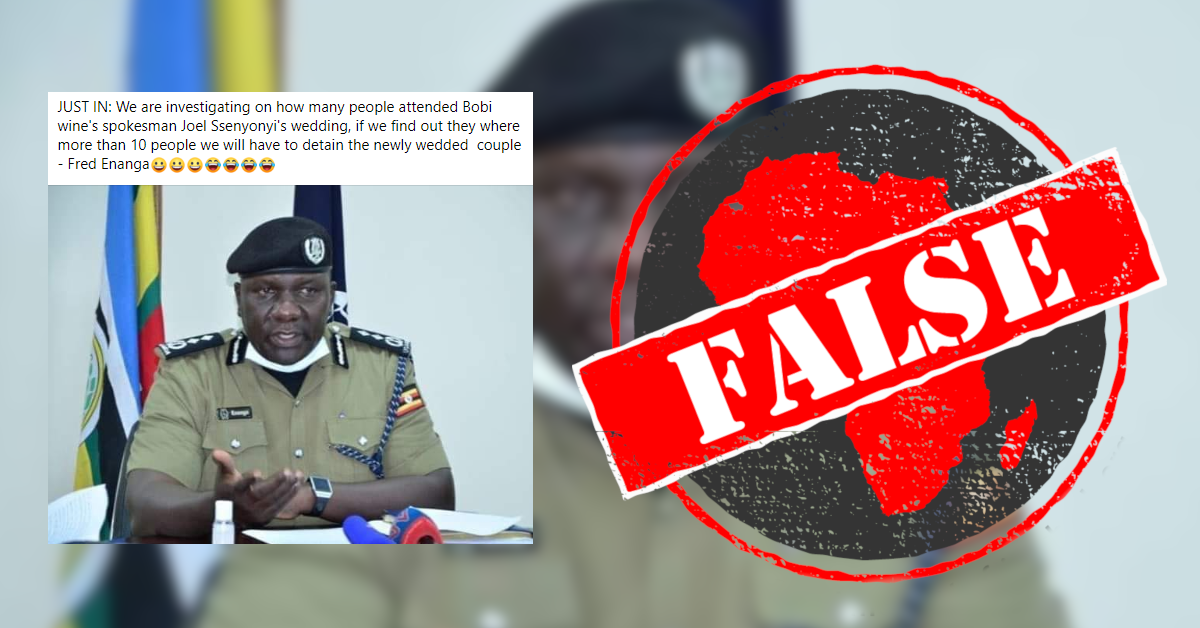Uganda’s police are investigating guests who attended the wedding of Joel Ssenyonyi, spokesperson for the country’s People Power resistance movement. That’s according to a post published on the Times of Kampala Facebook page on 28 June 2020.
“JUST IN: We are investigating how many people attended Bobi Wine’s spokesman Joel Ssenyonyi wedding, if we find out there were more than 10 people we will have to detain the newly wedded couple -Fred Enanga,” it reads.
Enanga is the spokesperson for Uganda’s police. Bobi Wine is the stage name of Ugandan parliamentarian-cum-musician Robert Kyagulanyi, People Power’s leader.
On 24 March Uganda’s government introduced public health rules to curb the spread of Covid-19. The rules prohibit gatherings of more than 10 people at weddings, parties and funerals.
Ugandan authorities have reportedly harassed Wine and his movement before. But have the police announced that they would be investigating guests at his spokesperson’s wedding?

The post was published the day after Wine shared news of Ssenyonyi’s wedding on Twitter.
“It's wedding day for our spokesperson, Joel Ssenyonyi. Hearty congratulations, and best wishes to you two as you embark on this journey,” he tweeted on 27 June.
On 29 June, the Uganda Police Force tweeted a screenshot of the Facebook post, simply stamped “FAKE NEWS”.
The police are not investigating the wedding guests. – Grace Gichuhi
“JUST IN: We are investigating how many people attended Bobi Wine’s spokesman Joel Ssenyonyi wedding, if we find out there were more than 10 people we will have to detain the newly wedded couple -Fred Enanga,” it reads.
Enanga is the spokesperson for Uganda’s police. Bobi Wine is the stage name of Ugandan parliamentarian-cum-musician Robert Kyagulanyi, People Power’s leader.
On 24 March Uganda’s government introduced public health rules to curb the spread of Covid-19. The rules prohibit gatherings of more than 10 people at weddings, parties and funerals.
Ugandan authorities have reportedly harassed Wine and his movement before. But have the police announced that they would be investigating guests at his spokesperson’s wedding?

‘Fake news’
The post was published the day after Wine shared news of Ssenyonyi’s wedding on Twitter.
“It's wedding day for our spokesperson, Joel Ssenyonyi. Hearty congratulations, and best wishes to you two as you embark on this journey,” he tweeted on 27 June.
On 29 June, the Uganda Police Force tweeted a screenshot of the Facebook post, simply stamped “FAKE NEWS”.
The police are not investigating the wedding guests. – Grace Gichuhi
Republish our content for free
For publishers: what to do if your post is rated false
A fact-checker has rated your Facebook or Instagram post as “false”, “altered”, “partly false” or “missing context”. This could have serious consequences. What do you do?
Click on our guide for the steps you should follow.
Publishers guideAfrica Check teams up with Facebook
Africa Check is a partner in Meta's third-party fact-checking programme to help stop the spread of false information on social media.
The content we rate as “false” will be downgraded on Facebook and Instagram. This means fewer people will see it.
You can also help identify false information on Facebook. This guide explains how.


Add new comment